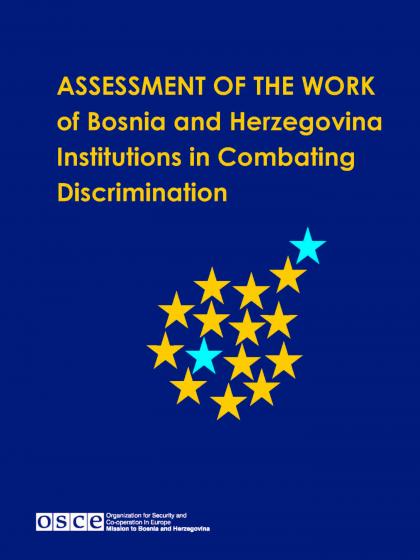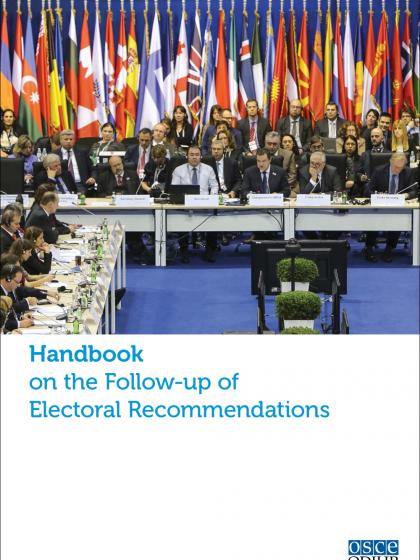Publications
Annual Report of the Secretary General on Police-Related Activities in 2018
Publishing date: 8 August 2019
Content type: Annual report
Where we are: OSCE Secretariat
What we do: Policing
Publisher: Organization for Security and Co-operation in Europe
This report provides a comprehensive overview of all police-related projects, activities and events, which draw on the combined strength of the OSCE’s Institutions and its network of field operations, often cutting across the OSCE’s three security dimensions.
OSCE-led Survey on Violence Against Women: Montenegro- Results Report
Publishing date: 5 July 2019
Collections: OSCE-led Survey on Violence Against Women
Content type: Study / report
Where we are: OSCE Secretariat
What we do: Gender equality
Publisher: Organization for Security and Co-operation in Europe
This report presents the representative survey findings of the OSCE-led Survey on the Well-being and Safety of Women for Montenegro. The survey was implemented in 2018 in selected countries in South Eastern Europe and Eastern Europe. The OSCE-led survey included a quantitative and qualitative component and was undertaken with the goal of providing comparable data on different forms of violence women experience in their childhood and throughout the course of their lives. The research examined violence that women experience in conflict and non-conflict settings, as well as the impact violence has on women and girls, including its lasting consequences. Questions on norms and attitudes connected to violence against women were asked to better understand the underlying causes of violence.
OSCE-led Survey on Violence Against Women: Moldova- Results Report
Publishing date: 5 July 2019
Collections: OSCE-led Survey on Violence Against Women
Content type: Study / report
Where we are: OSCE Secretariat
What we do: Gender equality
Publisher: Organization for Security and Co-operation in Europe
This report presents the representative survey findings of the OSCE-led Survey on the Well-being and Safety of Women for Moldova. The survey was implemented in 2018 in selected countries in South Eastern Europe and Eastern Europe. The OSCE-led survey included a quantitative and qualitative component and was undertaken with the goal of providing comparable data on different forms of violence women experience in their childhood and throughout the course of their lives. The research examined violence that women experience in conflict and non-conflict settings, as well as the impact violence has on women and girls, including its lasting consequences. Questions on norms and attitudes connected to violence against women were asked to better understand the underlying causes of violence.
OSCE-led Survey on Violence Against Women- Thematic Report- Experiences of disadvantaged women
Publishing date: 13 September 2019
Collections: OSCE-led Survey on Violence Against Women
Content type: Study / report
Where we are: OSCE Secretariat
What we do: Gender equality
Publisher: Organization for Security and Co-operation in Europe
This report focuses on the findings of the OSCE-led survey on the Well-being and Safety of Women and their implications for disadvantaged women. It focuses on the broader trends that emerged around the experiences of different demographic groups of women across the region and how disadvantaged groups of women are affected by violence compared with women generally.
Coalition Building for Tolerance and Non-Discrimination: A Practical Guide
Publishing date: 25 June 2018
Collections: Guides Related to Hate Crime
Content type: Guide / manual / handbook
Where we are: OSCE Office for Democratic Institutions and Human Rights
What we do: Tolerance and non-discrimination
Publisher: Organization for Security and Co-operation in Europe
Coalition building is about individual organizations amplifying their voices by working together. Anti-Semitism, intolerance and discrimination are deeply embedded across the OSCE region and addressing them requires the combined efforts of many communities and organizations. It cannot be accomplished in any large measure by just one group acting on its own. By bringing together groups with different skills, experiences, resources and connections, coalitions can be a powerful ways to bring about large-scale, enduring changes to address issues of discrimination. ODIHR’s new guide offers community leaders and civil society organizations in the OSCE region a human rights-based approach and practical basis for building successful coalitions aimed at addressing discrimination and fostering more tolerant and peaceful societies. By providing multiple resources and good practices, tips for gender mainstreaming and step-by-step instructions, this guide serves as a starting point not only for civil society organizations and communities setting out to create successful coalitions that strengthen responses to intolerance and discrimination, but for all members of civil society who wish to create coalitions to advance their goals.
Election Observation Handbook: Sixth Edition
Publishing date: 11 June 2010
Content type: Guide / manual / handbook
Where we are: OSCE Office for Democratic Institutions and Human Rights
What we do: Elections
Publisher: Organization for Security and Co-operation in Europe
Assessment of the Work of Bosnia and Herzegovina Institutions in Combating Discrimination
Publishing date: 19 March 2019
Content type: Study / report
Where we are: OSCE Mission to Bosnia and Herzegovina
What we do: Human rights, Rule of law, Tolerance and non-discrimination
Publisher: Organization for Security and Co-operation in Europe
The Law on Prohibition of Discrimination (LPD) was adopted by the Bosnia and Herzegovina (BiH) Parliamentary Assembly in 2009. It was subsequently amended in 2016, with the goal of strengthening BiH mechanisms designed to fight discrimination, particularly against persons of vulnerable social categories.
Handbook on the Follow-up of Electoral Recommendations
Publishing date: 6 June 2016
Collections: Election handbooks
Content type: Guide / manual / handbook
Where we are: OSCE Office for Democratic Institutions and Human Rights
What we do: Elections
Publisher: Organization for Security and Co-operation in Europe
This handbook sets out ODIHR’s approach and practices in assisting participating States in the follow-up of electoral recommendations. While ODIHR has conducted follow-up activities for several years, this handbook aims to establish a more systematic approach that provides clarity and consistency and promotes greater attention to the implementation of recommendations. It has been developed on the basis of generous extra-budgetary contributions as part of ODIHR’s continued effort to improve its methodology and to increase professionalism in election observation activities. The handbook is primarily intended for actors in OSCE participating States addressing ODIHR’s electoral recommendations, but it will also be of use to those following up on recommendations outside the OSCE region.
Survey on the nature and scale of unreported hate crimes against members of selected communities in Poland: Survey report
Publishing date: 26 February 2019
Collections: Poland: Project Background Documents
Content type: Study / report
Where we are: OSCE Office for Democratic Institutions and Human Rights
What we do: Tolerance and non-discrimination
Publisher: Organization for Security and Co-operation in Europe
This study was commissioned by the OSCE Office for Democratic Institutions and Human Rights (ODIHR) and the Commissioner for Human Rights of Poland, and implemented by Ipsos Poland.
Youth Progress Index 2017
Publishing date: 16 October 2018
Content type: Study / report
Where we are: OSCE Office for Democratic Institutions and Human Rights
What we do: Democratization
Publisher: Organization for Security and Co-operation in Europe
This Youth Progress Index (YPI) report aims to present a roadmap – a useful and practical tool – that can help all youth stakeholders, from young people and youth-led organizations to policymakers and the business community, prioritize their respective policy and investment decisions, assess where resources should be focused, and implement policies and programs that will drive faster and more sustainable progress for young people. The YPI is one of the first tools developed to explore the status of youth, independent of economic indicators. The YPI draws on reliable, relevant data to give each country a score on how effectively they meet the elements of the Social Progress Index Framework: Basic Human Needs, Foundations of Wellbeing, and Opportunity.










